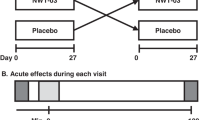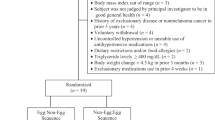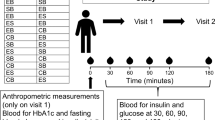Abstract
Purpose
While animal and in vitro data demonstrate vasodilatory effects of egg white-derived peptides, human studies are lacking. We investigated for the first time the effects of an egg ovalbumin-derived protein hydrolysate on blood pressure (BP) and cardiovascular risk.
Methods
A double-blind, placebo-controlled randomized crossover trial was implemented in 75 adults aged 50–70 years with systolic BP (130–≤ 150 mmHg). Participants were randomized to an egg ovalbumin-derived protein hydrolysate (3 g/day) or placebo (3 g/day). Participants completed two 6-week periods separated by a 3-week washout.
Results
Data from 65 participants with a mean systolic BP (135.1 ± 11 mmHg) were included. Mean office and central BP and arterial stiffness (assessed by carotid-femoral pulse wave velocity (cfPWV) or pulse wave analysis (PWA)) did not change over time and no significant differences were observed between the egg protein hydrolysate and placebo groups (P > 0.05). Similarly, no significant effects of this egg ovalbumin-derived protein hydrolysate on blood lipid and glucose concentrations (P > 0.05) were observed.
Conclusion
This is the first dietary intervention to investigate the effects of egg ovalbumin-derived protein hydrolysates on cardiovascular risk in humans. Despite promising findings from animal and in vitro studies, this RCT does not support the hypothesis that consumption of an egg ovalbumin-derived protein hydrolysate for 6 weeks in adults with a high-normal BP results in a reduction in BP or the modification of cardiovascular risk.

Similar content being viewed by others
Abbreviations
- ACE:
-
Angiotensin-converting enzyme
- AE:
-
Adverse events
- BP:
-
Blood pressure
- cfPWV:
-
Carotid to femoral pulse wave velocity
- CVD:
-
Cardiovascular disease
- NO:
-
Nitric oxide
- PWA:
-
Pulse wave analysis
- RCT:
-
Randomized controlled trial
References
Mozaffarian D, Benjamin EJ, Go AS, Arnett DK et al (2016) Heart disease and stroke statistics—2016 update. Rep Am Heart Assoc 133:e38–e360
Landsberg L, Aronne LJ, Beilin LJ, Burke V et al (2013) Obesity-related hypertension: pathogenesis, cardiovascular risk, and treatment: a position paper of the obesity society and the American society of hypertension. J Clin Hypertens 15:14–33
Appel LJ, Moore TJ, Obarzanek E, Vollmer WM et al (1997) A clinical trial of the effects of dietary patterns on blood pressure. New Engl J Med 336:1117–1124
Saneei P, Salehi-Abargouei A, Esmaillzadeh A, Azadbakht L (2014) Influence of dietary approaches to stop hypertension (DASH) diet on blood pressure: a systematic review and meta-analysis on randomized controlled trials. Nutr Metab Cardiovas 24:1253–1261
Hernández-Ledesma B, Del Mar Contreras M, Recio I (2011) Antihypertensive peptides: Production, bioavailability and incorporation into foods. Adv Colloid Interface Sci 165:23–35
Cicero AFG, Fogacci F, Colletti A (2017) Potential role of bioactive peptides in prevention and treatment of chronic diseases: a narrative review. Br J Pharmacol 174:1378–1394
Cicero AFG, Gerocarni B, Laghi L, Borghi C (2011) Blood pressure lowering effect of lactotripeptides assumed as functional foods: a meta-analysis of current available clinical trials. J Hum Hypertens 25:425–436
Pripp AH (2008) Effect of peptides derived from food proteins on blood pressure: a meta-analysis of randomized controlled trials. Food Nutr Res. https://doi.org/10.3402/fnr.v52i0.1641
Miguel M, Manso MA, Martín-Álvarez PJ, Aleixandre A et al (2007) Angiotensin-converting enzyme activity in plasma and tissues of spontaneously hypertensive rats after the short- and long-term intake of hydrolysed egg white. Mol Nutr Food Res 51:555–563
Miguel M, López-Fandiño R, Ramos M, Aleixandre A (2006) Long-term intake of egg white hydrolysate attenuates the development of hypertension in spontaneously hypertensive rats. Life Sci 78:2960–2966
Garcia-Redondo AB, Roque FR, Miguel M, López-Fandiño R et al (2011) Vascular effects of egg white-derived peptides in resistance arteries from rats. Structure-activity relationships. J Sci Food Agr 90:1988–1993
Miguel M, López-Fandiño R, Ramos M, Aleixandre A (2005) Short-term effect of egg-white hydrolysate products on the arterial blood pressure of hypertensive rats. Br J Nutr 94:731–737
Plat J, Severins N, Morrison S, Mensink RP (2017) Effects of NWT-03, an egg-protein hydrolysate, on blood pressure in normotensive and mild hypertensive men and women: a dose-finding study. Br J Nutr 117:942–950
Cicero AF, Rosticci M, Veronesi M, Bacchelli S et al (2010) Hemodynamic effects of lactotripeptides from casein hydrolysate in Mediterranean normotensive subjects and patients with high-normal blood pressure: a randomized, double-blind, crossover clinical trial. J Med Food 13:1363–1368
Van Mierlo LA, Koning MMG, Van Zander KD, Draijer R (2009) Lactotripeptides do not lower ambulatory blood pressure in untreated whites: results from 2 controlled multicenter crossover studies. Am J Clin Nutr 89:617–623
Miguel M, Recio I, Gomez-Ruiz JA, Ramos M, Lopez-Fandino R (2004) Angiotensin I-converting enzyme inhibitory activity of peptides derived from egg white proteins by enzymatic hydrolysis. J Food Prot 67:1914–1920
Davalos A, Miguel M, Bartolome B, Lopez-Fandino R (2004) Antioxidant activity of peptides derived from egg white proteins by enzymatic hydrolysis. J Food Prot 67:1939–1944
Grootaert CJG, Matthijs B, Pitart J, Baggerman G et al (2017) Quantification of egg ovalbumin hydrolysate-derived anti-hypertensive peptides in an in vitro model combining luminal digestion with intestinal Caco-2 cell transport. Food Res Int 99:513–541
Miguel M, Aleixandre A (2006) Antihypertensive peptides derived from egg proteins. J Nutr 136:1457–1460
Miguel M, Manso M, Aleixandre A, Alonso MJ et al (2007) Vascular effects, angiotensin I-converting enzyme (ACE)-inhibitory activity, and antihypertensive properties of peptides derived from egg white. J Agr Food Chem 55:10615–10621
Mancia G, Fagard R, Narkiewicz K, Redon J et al (2014) 2013 ESH/ESC practice guidelines for the management of arterial hypertension. Blood Press 23:3–16
Laurent S, Marais L, Boutouyrie P (2016) The noninvasive assessment of vascular aging. Can J Cardiol 32:669–679
Friedewald WT, Levy RI, Fredrickson DS (1972) Estimation of the concentration of low-density lipoprotein cholesterol in plasma, without use of the preparative ultracentrifuge. Clin Chem 18:499–502
Cicero AFG, Aubin F, Azais-Braesco V, Borghi C (2013) Do the lactotripeptides isoleucine–proline–proline and valine–proline–proline reduce systolic blood pressure in European subjects? A meta-analysis of randomized controlled trials. Am J Hypertens 26:442–449
Fekete ÁA, Givens DI, Lovegrove JA (2015) Casein-derived lactotripeptides reduce systolic and diastolic blood pressure in a meta-analysis of randomised clinical trials. Nutrients 7:659–681
Fekete ÁA, Givens DI, Lovegrove JA (2016) Can milk proteins be a useful tool in the management of cardiometabolic health? An updated review of human intervention trials. Proc Nutr Soc 75:328–341
Boelsma E, Kloek J (2010) IPP-rich milk protein hydrolysate lowers blood pressure in subjects with stage 1 hypertension, a randomized controlled trial. Nutr J 9:52
Cicero AFG, Colletti A, Rosticci M, Cagnati M et al (2016) Effect of lactotripeptides (isoleucine–proline–proline/valine–proline–proline) on blood pressure and arterial stiffness changes in subjects with suboptimal blood pressure control and metabolic syndrome: a double-blind, randomized, crossover clinical trial. Metab Syndr Rel Disord 14:161–166
Seppo L, Jauhiainen T, Poussa T, Korpela R (2003) A fermented milk high in bioactive peptides has a blood pressure-lowering effect in hypertensive subjects. Am J Clin Nutr 77:326–330
Turpeinen AM, Ehlers PI, Kivimäki AS, Järvenpää S et al (2011) Ile–Pro–Pro and Val–Pro–Pro tripeptide-containing milk product has acute blood pressure lowering effects in mildly hypertensive subjects. Clin Exp Hypertens 33:388–396
McEniery CM, Cockcroft JR, Roman MJ, Franklin SS et al (2014) Central blood pressure: current evidence and clinical importance. Eur Heart J 35:1719–1725
Roman MJ, Devereux RB, Kizer JR, Okin PM et al (2009) High central pulse pressure is independently associated with adverse cardiovascular outcome: the strong heart study. J Am Coll Cardiol 54:1730–1734
Cicero AFG, Rosticci M, Gerocarni B, Bacchelli S et al (2011) Lactotripeptides effect on office and 24-h ambulatory blood pressure, blood pressure stress response, pulse wave velocity and cardiac output in patients with high-normal blood pressure or first-degree hypertension: a randomized double-blind clinical trial. Hypertens Res 34:1035–1040
Jauhiainen T, Ronnback M, Vapaatalo H, Wuolle K et al (2010) Long-term intervention with Lactobacillus helveticus fermented milk reduces augmentation index in hypertensive subjects. Eur J Clin Nutr 64:424–431
Miguel M, Alonso MJ, Salaices M, Aleixandre A et al (2007) Antihypertensive, ACE-inhibitory and vasodilator properties of an egg white hydrolysate: effect of a simulated intestinal digestion. Food Chem 104:163–168
Miguel M, Alvarez Y, López-Fandiño R, Alonso MJ et al (2007) Vasodilator effects of peptides derived from egg white proteins. Regul Peptides 140:131–135
Manso MA, Miguel M, Even J, Hernández R et al (2008) Effect of the long-term intake of an egg white hydrolysate on the oxidative status and blood lipid profile of spontaneously hypertensive rats. Food Chem 109:361–367
Liu YF, Oey I, Bremer P, Carne A, Silcock P (2017) Bioactive peptides derived from egg proteins: A review. Crit Rev Food Sci 13:1–23
Sato K, Urado D (2015) in Detection and identification of food-derived peptides in human blood: food-derived short chain peptidomes in human blood, in Genomics, proteomics and metabolomics in nutraceuticals and functional foods: Second Edition, pp 441–452
Rosendorff C, Black CP, Cannon BJ, Gersh BJ, Gore J, Izzo JL, Kaplan NM, O'Connor CM, O'Gara PT, Oparil S, American Heart Association Council for High Blood Pressure Research, American Heart Association Council on Clinical Cardiology, American Heart Association Council on Epidemiology and Prevention (2007) Treatment of hypertension in the prevention and management of ischemic heart disease: a scientific statement from the American Heart Association council for high blood pressure research and the councils on clinical cardiology and epidemiology and prevention. Circulation 115:2761–2788
Acknowledgements
The authors thank all volunteers for participating in the study, and Dr Charlotte Grootaert (Dept of Food Safety and Food Quality, Ghent University, Belgium) and Dr Stefan Vorspooels (Flemisch Institute for Technological Research), Belgium for informing on the in vitro stability of this egg ovalbumin-derived peptide digestate fraction. This RCT was part of the EC funded BACCHUS [Beneficial effects of dietary bioactive peptides and polyphenols on cardiovascular health in humans] project (http://www.bacchus-fp7.eu/) which received funding from the European Union Seventh Framework Programme (FP7/2007–2013) under Grant Agreement no 321090. PAK received additional support from the Biotechnology and Biological Sciences Research Council (Food and Health Institute Strategic Programme Grant, BB/J004545/1).
Author information
Authors and Affiliations
Contributions
MEK, AJL and PAK designed the study; MEK and AJL monitored the study, CH, EM and AJL conducted study visits, biochemical analysis and data entry. AJL and MEK analyzed and interpreted the data and wrote the manuscript. PAK modified the writing of the manuscript and read and approved the final manuscript.
Corresponding author
Ethics declarations
Conflict of interest
All authors have declared no conflicts of interest.
Electronic supplementary material
Below is the link to the electronic supplementary material.
Rights and permissions
About this article
Cite this article
Lucey, A.J., Heneghan, C., Manning, E. et al. Effect of an egg ovalbumin-derived protein hydrolysate on blood pressure and cardiovascular risk in adults with a mildly elevated blood pressure: a randomized placebo-controlled crossover trial. Eur J Nutr 58, 2823–2833 (2019). https://doi.org/10.1007/s00394-018-1832-9
Received:
Accepted:
Published:
Issue Date:
DOI: https://doi.org/10.1007/s00394-018-1832-9




